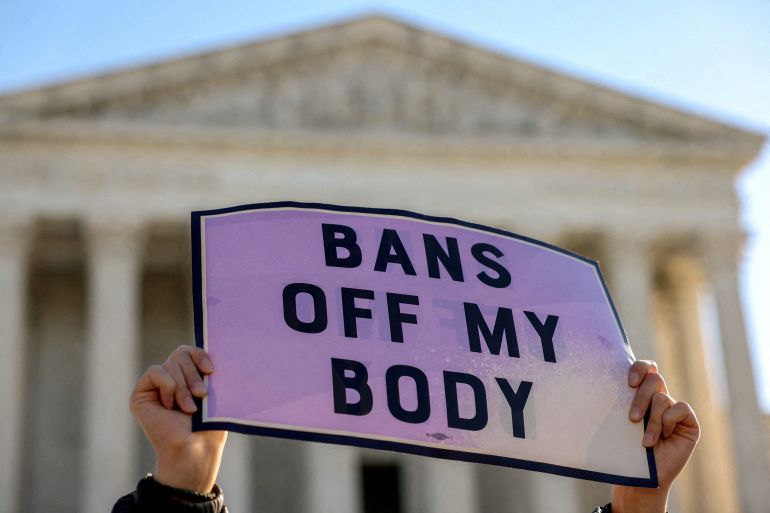Florida becomes latest US state to restrict abortion access
Law banning abortion at 15 weeks of pregnancy does not allow exemptions in cases of rape, incest or human trafficking.

The US state of Florida has become the latest place in the United States to pass legislation restricting women’s right to have an abortion, as Republican Governor Ron DeSantis signed a 15-week abortion ban into law.
The new law, which takes effect July 1, contains exceptions if the abortion is necessary to save a mother’s life, prevent serious injury or if the fetus has a fatal abnormality, but it does not allow for exemptions in cases where pregnancies were caused by rape, incest or human trafficking.
Keep reading
list of 3 itemsUS Supreme Court allows Kentucky official to defend abortion law
US: Oklahoma governor signs near-total abortion ban
“This will represent the most significant protections for life that have been enacted in this state in a generation,” DeSantis said as he signed the bill on Thursday at an evangelical church in the city of Kissimmee.
A battle over access to abortion is raging in the US, where the Supreme Court is expected to deliver a ruling by June on a Mississippi case that could see the landmark 1973 Roe v Wade decision – which established a woman’s right to have an abortion – overturned.

Should that happen, more than two dozen US states are poised to pass legislation banning abortion, according to an October report by the Guttmacher Institute, a reproductive rights research group.
Florida’s law marks a significant blow to abortion access in the country’s South, where the state has provided wider access to the procedure than its regional neighbours. Under current law, Florida allows abortions up to 24 weeks.
“Life is precious and children are a God-given gift,” said Florida Lieutenant Governor Jeanette Nunez in a statement shared by DeSantis on Thursday. “Governor DeSantis and I remain steadfast in our commitment to defending the sanctity of innocent human life and protecting the unborn.”
But human rights advocates have said the legislation is “cruel and dangerous”.
“The 15-week ban could have particularly harmful impacts on adolescents and young people who already face barriers and delays accessing abortion care because of Florida’s forced parental consent law,” researchers at Human Rights Watch said in a statement last month urging DeSantis to veto the legislation.
Florida Gov. Ron DeSantis just signed a 15-week abortion ban into law, threatening the rights, health, and dignity of Floridians.
The bill is particularly harmful for young people already facing barriers to abortion care.
Read more here ➡️ https://t.co/1gM2sXhdEa pic.twitter.com/zDb9ml7d8U
— Human Rights Watch (@hrw) April 14, 2022
“That law requires anyone under 18 to get consent from a parent or legal guardian before having an abortion or endure a potentially traumatizing court process,” they said.
On Tuesday, the state of Oklahoma signed into law a near-total abortion ban that is due to take effect in August and makes it illegal to perform abortions unless in medical emergencies.
A day later, the Kentucky legislature effectively suspended legal abortion access with a strict law of its own. The measure imposes requirements that clinics say make it too logistically difficult and expensive to operate, including a provision requiring that fetal remains be cremated or interred.
Abortion rights advocacy groups have said they will challenge the bills in court, and two lawsuits were filed in Kentucky on Thursday, asking a judge to intervene to block the law from taking effect until it is litigated.
Kara Gross, legislative director and senior policy counsel at the American Civil Liberties Union (ACLU) of Florida, said the state’s abortion ban “would push abortion care out of reach for countless Floridians”, especially youth, those with fewer resources, and people who live in rural areas.
“Make no mistake: If this abortion ban goes into effect, it would have devastating consequences for pregnant people, especially those who are not able to afford to travel out of state in search of the essential health care they need,” Gross said in a statement.
“Nobody should be forced to carry a pregnancy against their will. We will take swift legal action to protect Floridians’ rights and defend against this cruel attack on our bodily autonomy.”